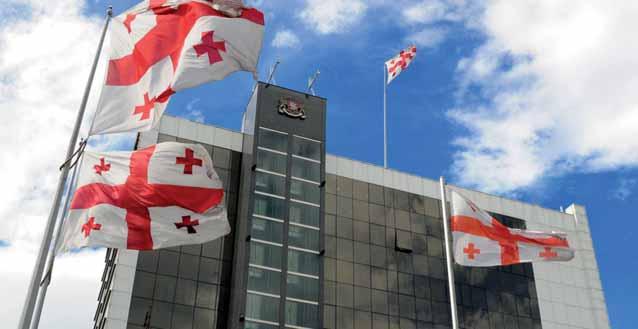
18 minute read
NEWS
from Issue #1300
Corona Updates: Int’l Support, a World Vaccine Defi cit and the Newly Reopened Land Borders
BY TEAM GT
Advertisement
Newly detected coronavirus cases in Georgia continue to maintain a decreasing trend, however, the death toll remains high compared to previous periods. Despite the fact that last week Amiran Gamkrelidze, Head of the Georgian National Center for Disease Control and Public Health (NCDC), announced “the end of the peak of the third wave,” the death rate among registered cases of COVID-19 has been rising, and is currently higher than it was in the autumn, during the second wave, with 24 deaths on Monday and 17 on Tuesday.
Georgia reported 821 coronavirus cases, 866 recoveries, and 31 deaths on Wednesday, with 38,478 tests performed across the country. Georgian capital Tbilisi recorded the highest number of 439 Covid-19 cases, followed by the Imereti region with 86 cases, and the Adjara region with 71 cases.
Currently, out of 708 critical patients, 199 require mechanical ventilation.
On Thursday Georgia reported 705 coronavirus cases, 1128 recoveries, and 14 deaths. 33,253 tests were conducted across the country. The daily test-positivity rate stands at 2.12%
INTERNATIONAL SUPPORT
Georgia’s international partners continue to support the country in its fi ght against the pandemic. On June 7, it was announced that Georgia’s vaccination rollout would be strengthened with $34.5 million additional fi nancing from the World Bank. “Georgia’s COVID-19 vaccination efforts will gain a major boost thanks to $34.5 million in additional fi nancing approved by the World Bank Board of Executive Directors. This fi nancing augments the original $80 million Georgia Emergency COVID-19 Response Project, approved in March 2020 with the purpose of helping Georgia address and mitigate the health and social impacts of the COVID19 pandemic,” announced the World Bank.
As the World Bank reports, the primary objectives of the Additional Financing are to enable affordable and equitable access to COVID-19 vaccines, help ensure effective vaccine deployment in Georgia by strengthening the vaccination system, and further boost preparedness and response activities under the parent project. Through this support, the Bank will contribute to the government’s plan to vaccinate 60% of the adult population in 2021. It will help the acquisition and deployment of eligible COVID-19 vaccines, including syringes and other supplies, vaccine logistics and distribution, planning and management, vaccinerelated communication and outreach, training, and overall health system strengthening.
VACCINATION
Georgia, Ukraine and Kosovo are to be the fi rst three European countries to receive the coronavirus vaccine from the United States, the US Embassy in Tbilisi announced on Monday. The United States is also committed to supporting economic recovery from the pandemic, the Embassy said. "This week, President Biden announced that the United States will share COVID19 vaccines with Georgia, because none of us are safe until all of us are safe. Georgia, Ukraine, and Kosovo are the fi rst three European countries expected to receive vaccines from the United States, based on regional priorities and partnerships. The US is also committed to supporting economic recovery from the pandemic," reads the Embassy statement.
In addition, Latvia will allocate 15,000 doses of coronavirus vaccine to Georgia, Latvian Foreign Minister Edgars Rinkevics announced following his meeting with his Georgian counterpart David Zalkaliani on Monday.
The NCDC’s Amiran Gamkrelidz said that more than 3 million 200 thousand doses of coronavirus vaccine will be delivered to the country from July to October, but highlighted that there is currently a global shortage of vaccines.
“There is a global shortage of vaccines. So far, the country has received 315 thousand doses of vaccine, which are being administered. July-August-SeptemberOctober have already been approved for, and we can expect 3 million 200 thousand further doses of vaccine to be delivered,” he said.
He did not specify which vaccine the US will provide Georgia, but added: "most likely, we will receive several tens of thousands of doses of one of the American-made vaccines this summer."
As of June 10, a total of 191,001 vaccinations had been administered, while nearly 55,000 people are fully vaccinated.
MEANWHILE, IN THE NEIGHBORING COUNTRIES…
The Government of Georgia opened land and sea borders on June 1, making the epidemiological situation in those countries with which Georgia is connected by land even more relevant for its citizens and healthcare sector.
Daily new COVID-19 cases in Russia stood at nearly 10 thousand on June 8, having increased steadily over the past week. The total number of confi rmed cases of the disease in the country stands at around 5.1 million, with the capital Moscow accounting for the largest number of infected individuals.
The epidemiological situation has been stabilized in neighboring Azerbaijan. The country reported only 68 new cases and 1 new death on June 9. Its total number of confi rmed cases reached 334,917, among them, 327,626 people recovered and 4948 died.
The same can be said about Armenia, where a maximum 100 newly detected cases were reported daily throughout the week, with 99 new cases and 11 new deaths recorded on June 9. Its total number of confi rmed cases has reached 223,384, among them, 214,690 people recovered and 4774 died.
The situation is vastly more diffi cult in Turkey, where 5000-6000 new cases are being reported daily, with 6,454 new cases and 87 new deaths reported on June 9. Its total number of confi rmed cases has reached 5,306,690, among them, 5,179,833 people recovered and 48,428 died.
Tbilisi, as World Book Capital, to Offer Musical Evening “Digital Line”
BY KETEVAN SKHIRTLADZE
Within the framework of “Tbilisi – World Book Capital”, on June 12, at 19:00, an audio-musical evening “Digital Line” is planned.
The performance is a combination of unique voice recordings of Georgian poets preserved in the Georgian Audio Fund and music created especially for this event.
The evening will be opened by moderators Rati Amaglobeli and Shota Iatashvili, who will reveal old and new interesting facts about Georgian literature and poetry. Poet Dato Chikhladze will take part in the performance, and music will be performed by the band of Ben Wheeler, Sandro Chinchaladze, and Vazha Marie.
“Tbilisi – World Book Capital” is a UNESCO project implemented with the fi nancial support of Tbilisi City Hall.
Attendance at the event is free.

Anastasia Chkhartishvili, 12, a Rising Star of Table Tennis, Prepares to Participate in the European Championship in Croatia
Anastasia Chkhartishvili is name is well-recognizable to people interested in table tennis in Georgia. She is a talented 12-year-old girl who can unreservedly be called a young rising star of table tennis.
Since 2021, when Anastasia started to compete among the cadets, she has been able to win almost every major tournament, regardless of her age.
In March this year, she became the champion of the Tbilisi Cadet Girls Tournament, the Tbilisi Women’s Tournament Champion, the Vice-Champion of the Georgian Cadet Girls Championship (U15), the Georgian Cadet Girls Championship (U15), and Champion of Georgia among cadet girls and boys (U15) at the Georgian Championship in mixed doubles.
She also became the absolute champion (without losing a tour) of the Adult League, a three-month “Be Active” tournament among the cadet girls. She is the fi rst girl to win the right to play in the Super League, and is among the strongest players in table tennis in Georgia.
Anastasia is currently training intensively with the Georgian cadet U15 team to participate in the European Championship, scheduled for July in Croatia, under the direct supervision of the Georgian national team coach Nino Ninoshvili. Anastasia is also assisted by current athletes Levan Pavliashvili and Lasha Lomia, multiple champions of Georgia, as well as coaches Kote Kharati and Dima Firzadov.
We wish Anastasia success and that she will achieve her goal with dignity!



Who Protects the State?
A Familiar and “Unfamiliar” Question Pertaining to National Defense
ANALYSIS BY VICTOR KIPIANI, CHAIRMAN OF GEOCASE, A TBILISI-BASED THINK-TANK
The State of Israel has faced many challenges since its declaration of independence. Most recently, paramilitary terrorist units fi red hundreds of missiles towards Israeli cities, causing casualties and destruction. As always in such confl icts, our ally continues to demonstrate the exemplary resilience that springs from the indomitable spirit of the Israeli nation and the state's unwavering determination to stand up to any aggression; and as always, the Israeli nation enjoys the full support and assistance of the civilized world. When fi ghting for the right to exist as a nation-state, it is natural to maintain a certain national dignity, to pursue a plan of peaceful development, to have a distinctive and unique voice among the cultures of the world, and to work and collaborate with others for the construction of a peaceful, just, and fair system of coexistence capable of effectively deterring all attempts to follow the path of violence or inequality.
However, in this long-familiar story, it is interesting to convey the main message in a different way. The most important implication of this statement is related to Israel's will and ability to exist, act, and develop - fi rst and foremost thanks to its own national resources, readiness and dedication. The State of Israel has almost never lacked the highly practical support of a key ally as well as the political support of a number of other countries. The right of the Jewish nation to form a state was reinforced by both historically unwritten laws and by the norms of written ones, but from 1948 to the present it is the Jewish nation itself that has publicly and tirelessly underlined its right to its own nation state. Moreover, the uniqueness of this country and the specifi city of its political, economic and security systems boldly suggest that in the foreseeable future the original nature of the Jewish state’s organization will once again be based upon its own capabilities and state of readiness. The main starting point for enforcing Israel's right to exist are the autonomy, independence and national interests of the Jewish people.
TO ELABORATE ON THE INTRODUCTION
In the process of exercising their autonomous national will, it is obvious that both the facilitation of this process by partners and its substantiation by international law will continue to be relevant. Yet it is also clear that the effectiveness of this facilitation by external actors increases when, in addition to the fact that your cause is fundamentally righteous, you also personally demonstrate your ability to successfully defend and further your own national interests. And this attitude, both in the context of appropriate levels of public awareness and of the maintenance of an adequate infrastructure system, becomes even more relevant given the many processes currently under way around the world. As we discussed in detail in previous articles, these processes have in recent years been marked by a fundamental shift in the international order. Although it is of course too early to come to a fi nal conclusion regarding the contours of the future global order (or disorder?), a number of features can already be discerned: these are the dominant national agenda in relations between states, the reorganization of the global geo-economic network under the banner of economic nationalism, the further promotion of regionalism in world "affairs", and the formation of formal or informal alliances between states based upon national or thematic or situational interests.
Given these circumstances, the ability of a small country in a geopolitically complex region to protect and promote its own interests is particularly important. At the same time, a country requires a sense of reserve, as well as an orderly and self-suffi cient system of national state mobilization to help its international allies in their efforts to strengthen its security. Only a broad conceptual system of defense and security could be launched in such coordination, especially considering the nation's real readiness and organization, accompanied by allied and international legal support. In this equation, relying solely on the international component without possessing an effective national state "base" is nowadays a very risky experiment characterized by selfi shness and the conjuncture of Realpolitik.
And speaking of Realpolitik, one must note that acting according to the realistic, not imaginary or illusory, laws of politics is a practice that should also be established in countries larger than our small nation, and that certain global states also speak openly about the widespread use of such practices. For example, in a recent newspaper interview, US Secretary of State Blinken discusses foreign policy in a pragmatic rather than doctrinal context. According to him, when trying to solve problems, the main requirements are practical solutions and new forms of co-operation; and this idea, which echoes in the speeches and statements of many other US offi cials, once again reveals that our main strategic partner has adopted new standards of foreign policy making and evaluation.
Having found it necessary to provide this extensive introduction and the example of Israel, it is now perhaps time to return to such trite questions as who cares about Georgia's defense and security? And who are the main actors in this seemingly straightforward task?

BEFORE WE ANSWER THE QUESTIONS…
...Perhaps it would be good to look again at relations between countries in order to generalize over some of the necessary principles to facilitate the discussion. It is clear that all historical epochs or world order formations are distinguished by the accompanying characteristics of that given stage. However, despite such differences and imminent specifi city, the observation of the determinants of a state’s positioning in the foreign arena still leaves space for generalization.
That said, it would also be unacceptable to oversimplify the answer to this question, and in this regard we must note very briefl y that all the accompanying characteristics can be divided into two categories of system determinant. One of them is the purpose and acceptability of the idea for society, and the other is the real power at the hands of the state to carry out that very idea. It is also essential that, for the purposes of an effective and modern national defense system, the existence and coherence of both an idea that is properly and comprehensibly formulated and the material resources or power required to achieve it are equally necessary.
Essentially, the idea of "Georgia" grew and evolved throughout the long history of our nation, and is associated with the protection of liberty and sovereignty, the preservation of a national consciousness, the development of a true nation and the integrity of a concrete geographical space recognized by international norms. At this stage, we clearly have no complaints about the exact formulation of this idea, since the purpose of Georgian security is, I think, based on a broad public consensus and its basic theses remain unchanged.
A far more challenging task is to bring the second category to its full potential. The fact is that a lot of effort has been put into this path and more needs to be applied. However, the main point here is another thing: National defense must become a fi eld in which all the segments and layers of both the Georgian state and Georgian society work together, free from party politics. Achieving a fuller awareness of this issue would constitute a very strong step towards coming to a united understanding around a plan of action to establish an ideological determinant of defense.
THE AXIS OF GEORGIAN DEFENSE
The support that Georgia has received throughout virtually her entire period of re-independence has undeniably been vital, and our country has been very fortunate to be able to enjoy the strategic partnership of various allies in the fi eld of state development and indeed in all areas and fi elds, including national security and defense. There is of course no doubt that, without such continuous and substantial support, many of the tough challenges that Georgia is facing would have been exacerbated, and some may even in a sense have become insurmountable obstacles in the long run. The steps Tbilisi has taken on the path to Euro-Atlantic integration, which permit a moderate feeling of optimism, deserve special mention.
Here, too, it should be noted that, irrespective of the content of this or that order of Georgian defense, its existence in isolation from the general Western system is unimaginable, and would lead to unacceptable levels of political and defensive vulnerability. We would also like to note here that the current geopolitical landscape, especially in the context of the Black Sea region, offers a variety of collective security solutions with the West. In this regard, we have in previous publications already discussed in detail several variations, from bilateral agreements to more regional themes.
It is a fact that Georgia continues to make her civilizational choices geopolitically, strengthened by a broad degree of public consensus as well as by the rule of law. Of course, a successful move towards this key milestone would also require greater courage, improvisation and prudence, as well as the ability and fl exibility needed to successfully adapt to changing realities. We have repeatedly discussed the need for these features and their practical essence around various conceptual solutions in the fi elds of security and foreign policy.
At the same time, it is necessary to remind ourselves once again that the main axis of any model of national security and defense or institution is the unwavering will of the people of Georgia, the determination of each of her citizens (regardless of nationality or religion) to protect a country that they feel is their homeland. This case is superior to any other in its essence and pathos, because it is the duty of every adult member of Georgian society to unhesitatingly be the guarantor of their national interests; to care about the protection and promotion of these interests by taking into account rational and pragmatic international conjunctures; to represent Georgia's national interests in such a way that they are not overshadowed by other interests; and to make this interest an organic part of the process of civilizational choice.
The Georgian state and the entire partypolitical spectrum should therefore lead the way by ensuring that every major project or proposal is compatible with the country's overall national security system. We believe that this compatibility test should be applied to all global initiatives, regardless of their purpose or content, and this approach has indeed already been adopted by a number of advanced countries in which the security criterion is boldly used in the administration or authorization of decisionmaking. Such a measure is now not only a requirement refl ected at the level of policy documents, but also takes place in national legislation.
There is a simple explanation for this. The world, including our Western partners, is facing the re-emergence of a policy of direct politics that is part of a strategic competition between Great Powers. This phase will most likely go on for a long time. We must also "tame" the given "realism" in geopolitics and politics, and fi nd many non-standard ways tailored to our national interests in which the Georgian state can exist and develop in this environment. We must accelerate the abandonment of the old clichés and damaging stereotypes of old domestic and non-state "thinking" and reject Soviet-era dogmas more rapidly.
What is more, we must impress upon the people of Georgia the fact that national defense and security are not solely the responsibility of the country's armed forces and law enforcement agencies. In our current situation, this is a common concern conditioned by the development of more humane and modern forms of kinetic and asymmetric confrontation, as well as of hybrid variants of both. Much has already been said about this and will no doubt be repeated again in future.
A modern and competitive Georgian state must be based upon the effective and long-term co-ordination of various adjacent or interrelated (or sometimes unrelated) fi elds and professions, a coordination focused not upon self-promotion but instead upon achieving extremely practical and tangible results. This also means a modern, technocratic government of a corporate kind, a completely renewed and modernized political system, and a cultural, informed and objective society that imposes demands both upon itself and upon the government and political parties.
It is also important that both the Georgian state and society be selfl essly interested in independently seeking ways to continually develop and perfect real defensive or other capabilities. This is primarily what we need. Of course, all of Georgia's friends, partners and allies would welcome any increase in the resilience of our state and public institutions, but the reality is that currently none of them are positively bound to protect our sovereignty and territorial integrity. That is solely our responsibility, and this inherent obligation does not disappear when Georgia becomes a formal member of this or that bilateral or multilateral security system. After all, any such membership is a means to an end, not an end in itself, as we sometimes hear today.
Peace is conditioned by strength and not by weakness or one-sided concession – Israeli PM Netanyahu
THUS...
The time has come for accurate and impartial assessments that will determine how right and realistic the path of Georgia's development is. These assessments must be understandable to and shared by our allies and partners, for only actions based upon these assessments will be capable of generating real support. Avoiding or evading potential dangers and reducing risks only creates tempting and dangerous illusions.
We began with the example of Israel, and will return to it once again at the end of the article with a brief paraphrasis of a statement made by current Prime Minister Netanyahu: Peace is conditioned by strength and not by weakness or onesided concession; the goal of the Israeli state is to secure the future of its citizens, so Israel must always be able to protect itself from any threat. Given some parallels, these words could also be boldly applied to the main purpose and goal of the Georgian state.





